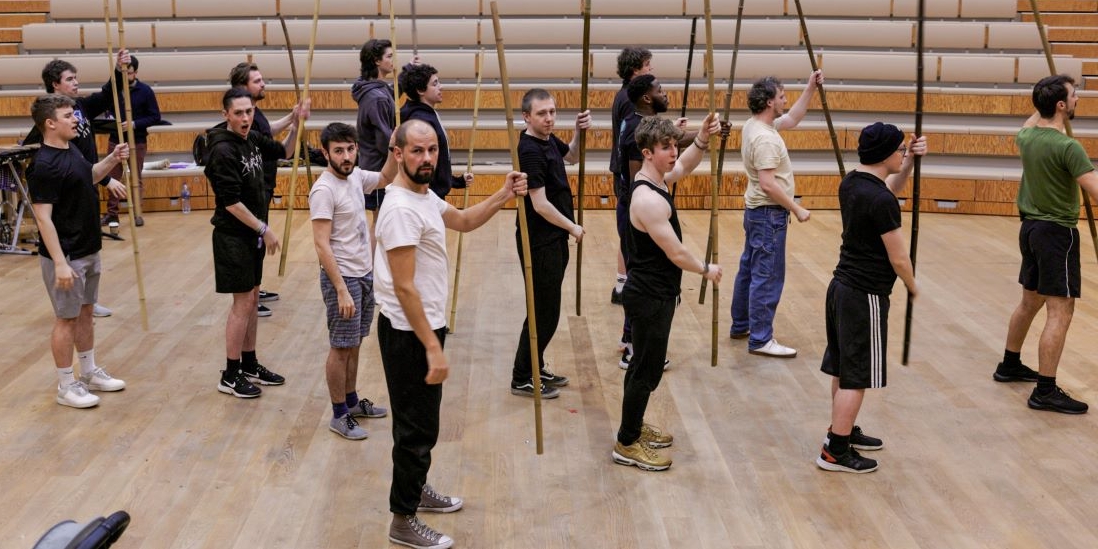While we take Athenian tragedy as the foundation of so much of what has followed in the Western dramatic tradition, how often do we stop to think about how little we know of this art form and how it was performed? We have only a handful of plays of Aeschylus, Sophocles and Euripides and very limited information about the music, staging and performance conventions involved. On the face of it there appear unsurmountable obstacles in the way of uncovering anything further; but David Greig’s revelatory reconstruction of a missing play by Aeschylus offers us fresh insights of rare and lasting value.
‘The Egyptians’ is the second part of a tetralogy where we do already have the first part – ‘The Suppliant Women’. So the plot is known, and its continuation through the mythology on which it draws. We also know the basic structure of the play – the number of chorus odes and scenes for principal actors interleaved between them, and that the playwright would have rehearsed both choreography and singing extensively before the competition at which the plays were performed. What David Greig and his collaborators, thespian and academic, have done is insert a very plausible and dramatically convincing narrative that conforms to what we know while working imaginatively in its own right.
The plot assumes that the male chorus has arrived outside the walls of the city of Argos in Greece in pursuit of their cousins whom they wish to marry. The women are opposed and have received sanctuary from the ruler of Argos, whom the sons of Aegyptos (‘Egyptians’) have just defeated. There are further layers superimposed – a conflict at the level of the gods between Zeus and Hera, the rights of the Argives in setting their own laws of sanctuary, and appropriate rites of burial for the defeated king (shades here of Sophocles’ ‘Antigone’). The debate is taken forward by a series of devised characters – a priestess of Hera and the mother of the defeated king – who argue out the issues with the male chorus. The denouement is provided by the father of the women, Danaos, who invites the chorus into the citadel promising the marriages will take place, though there are hints that this may turn out to be a false resolution to the drama.
Lest this seem rather dry stuff, let me emphasise how much text, movement, and music make it continuously engrossing. The whole is bound together and given propulsive, rugged energy by reliance on rhythm and alliteration that perceives the sonic parallels between Anglo-Saxon poetry and the verse of Greek tragedy. Choreography by Sasha Milavic Davies ensures that the chorus of fifteen men are continually reforming and regrouping dynamically with or without the staves they carry as symbolic weapons. John Browne’s music manages to be both slightly alien in feel and very accessible, capturing the raw and agressive moments as well as more lyrical interludes. Two musicians in the wings play a variety of percussion instruments as a continuous underscore of great subtlety that never overstays its welcome. Callum Armstrong also plays a recreation of the ‘aulos’ or Greek flute, providing a mournful, precise pointing to episodes of particular poignancy.
The fifteen young men of the chorus, with only six weeks’ preparation, master ninety minutes of complex moves, multiple rhythms and moods and a huge body of text. It it great to see a chorus embodying people of the right age at the time of original performance. Alongside them Omar Ebrahim finds the right blend of duplictous heartiness for Danaos, Tafline Steen is both pert and pertinent as Hera’s priestess, insisting on the rights and duties of marriage, and Derbhle Crotty is a passionate and afflicted advocate both for her deceased son’s body and the rights of Argos to make its own decisions. Oscar Batterham is an eloquent spokesman and the lead singer from the chorus.
The staging at the Gulbenkian leaves something to be desired, as those seated on the sides of the thrust stage had to contend with the full glare of banks of stage lighting; but this should not detract from the merits of a ground-breaking production that deserves to be seen more widely. It recaptures with immense skill and energy the way in which Greek drama balances intense story-telling with high-level debate over the leading issues of the day – how families should be managed and regulated, the boundaries of warrior masculinity, rights of sanctuary, and whether justice can be more than a process of conventions. All issues that are as relevant now as they were in 5th century Athens.

